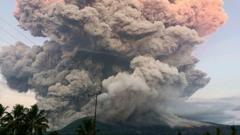The invasion of Israeli air strikes over Tehran has forced many citizens into distress, with a significant number fleeing the city while others, like one woman interviewed, express concern for their safety but choose to remain. Amid dwindling supplies and rising fear, the call for clarity echoes as citizens navigate through the uncertainty stemming from escalating military actions.
Tensions Rise in Tehran Amidst Israeli Air Strikes: A City in Uncertainty

Tensions Rise in Tehran Amidst Israeli Air Strikes: A City in Uncertainty
As Israeli jets continue air strikes over Tehran, many citizens grapple with fear, uncertainty, and the decision to stay or flee.
In the shadow of ongoing Israeli air strikes, thousands are evacuating Tehran, as fear grips the population. My sister's voice, crackling through WhatsApp from Tehran, reflects a sense of panic as she seeks answers from me, a journalist with the BBC in London. "What should we do?" she pleads, her questions amplified by US President Donald Trump's evacuation directive. "Is he serious?"
Since Thursday, the city has witnessed a barrage of Israeli planes combing the skies, often met with ineffective anti-aircraft fire. From her vantage point in an apartment, my sister is an eyewitness to the confrontation unfolding before her eyes, heightening her anxiety.
While the Israeli military has urged residents in her district to evacuate, she has opted to stay, believing the risks are manageable—as long as her area doesn’t harbor military installations. Yet, uncertainty looms, particularly regarding a nearby commercial unit potentially affiliated with the Revolutionary Guards, whose operations are shrouded in secrecy.
In a somber reflection of the situation, Tehran's Grand Bazaar has been shuttered, signifying economic and social strain, with reports of dwindling food supplies and businesses closing, including bakeries due to flour shortages. Despite chaotic road conditions and petrol scarcity, many residents are leaving, prompting an eerie silence in a city usually bustling with life.
In contrast, those who remain are likely to retreat indoors, wary of possible attacks. Meanwhile, fears extend beyond conventional violence, with concerns rising about the potential consequences of air strikes targeting Iran's nuclear facilities. Fortunately, early assessments from the global nuclear watchdog indicate stable radiation levels around recently struck sites.
As fear permeates the air, many Iranians turn to homegrown Persian-language television for news, with the BBC Persian service experiencing a surge in web traffic despite slow internet connections. While calls for Iran’s capitulation echo from the west, Supreme Leader Ayatollah Ali Khamenei's adamant refusal to surrender further complicates the unfolding crisis.
While public sentiment may be critical of the regime, the specter of anarchy following instability looms large in the minds of many, leaving them in a state of apprehension about their future amidst these tumultuous times.






















